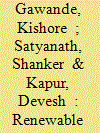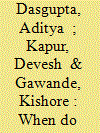| Srl | Item |
| 1 |
ID:
118174


|
|
|
|
|
| Publication |
2012.
|
| Summary/Abstract |
Olson hypothesized that a latent group's ability to organize and contribute toward providing a public good might be jeopardized by free riding. The politics of trade protection feature the collective action problem, since protection benefits all firms in the industry including those who contributed nothing to attaining it. This paper examines the extent of free riding in lobbying over tariffs in the context of the Grossman and Helpman (1994) protection-for-sale model in which industry lobbies seek to bend government policy in their favor. Previous investigations of the model have produced the puzzling result that governments are largely welfare-maximizing and care little about campaign contributions, in contrast to numerous examples of welfare-reducing policies that have in fact been bought cheaply by special interests. We think the result arises because the model assumes away free riding by firms which hinders industry's ability to organize politically. We introduce free riding into the Grossman-Helpman model, allowing industries to be partially organized. Using a new data set on US trade barriers, we test the model using estimation methods new to this literature. The estimates support the model's predictions and reveal that the extent of free riding by manufacturing firms can help resolve the puzzling result.
|
|
|
|
|
|
|
|
|
|
|
|
|
|
|
|
| 2 |
ID:
073975


|
|
|
|
|
| Publication |
2006.
|
| Summary/Abstract |
This article studies whether political campaign contributions influence agricultural protection in the United States in the manner suggested by the political economy model of Grossman and Helpman (1994). This is the first attempt to test this model using agricultural data. We test the model using a detailed cross-sectional data set of agricultural protection, subsidies, and PAC contributions in the late 1990s. The model is qualitatively affirmed by the data. We make a novel attempt to solve a puzzle about the model's quantitative implications, also found in recent studies. This solution makes the simple model consistent with the complicated decision-making process in real-world government. The results imply the underpinnings of a political economy equilibrium that will be hard to dislodge.
|
|
|
|
|
|
|
|
|
|
|
|
|
|
|
|
| 3 |
ID:
150994


|
|
|
|
|
| Summary/Abstract |
An interesting stream of the civil conflict literature has identified an important subset of civil conflicts with disastrous consequences, that is, those that emerge as a consequence of shocks to renewable natural resources like land and water. This literature is, however, reliant on qualitative case studies when claiming a causal relationship leading from renewable resource shocks to conflict. In this article, we seek to advance the literature by drawing out the implications of a well-known formal model of the renewable resources–conflict relationship and then conducting rigorous statistical tests of its implications in the case of a serious ongoing civil conflict in India. We find that a one standard deviation decrease in our measure of renewable resources increases killings by nearly 60 percent over the long run.
|
|
|
|
|
|
|
|
|
|
|
|
|
|
|
|
| 4 |
ID:
090611


|
|
|
| 5 |
ID:
154546


|
|
|
|
|
| Summary/Abstract |
Theory and extensive evidence connect poverty and underdevelopment to civil conflict yet evidence on the impact of development programs on violence is surprisingly mixed. To break this impasse, we exploit a within-country policy experiment to examine the conditions under which antipoverty programs reduce violence. The roll-out of India's National Rural Employment Guarantee Scheme caused a large long-run reduction in Maoist conflict violence, as measured with an original data set based on local-language press sources. These pacifying effects were not uniform, however, but overwhelmingly concentrated in districts with sufficient pre-existing local state capacity to implement the program effectively. The results demonstrate the potential for anti-poverty programs to mitigate violent civil conflict by improving livelihoods, but also highlight the crucial role of state capacity in shaping these effects.
|
|
|
|
|
|
|
|
|
|
|
|
|
|
|
|